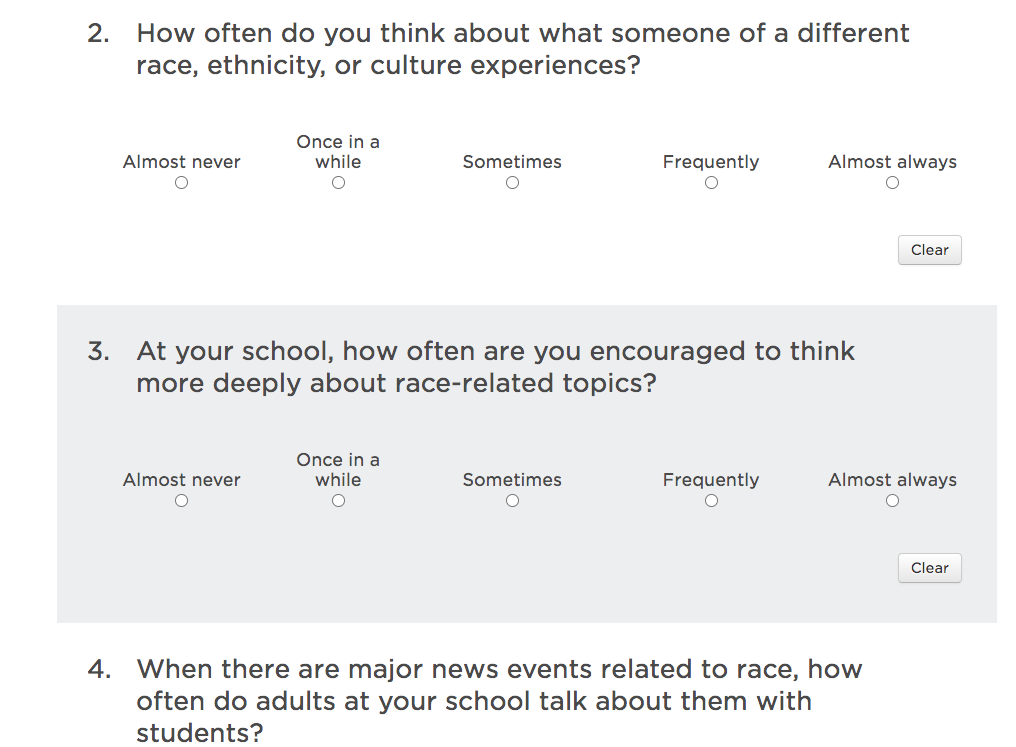Do 11-year-olds need to answer questions like this?
I hope you'll take take a look, give it some thought and tell me what you think
Last year my youngest son was sitting at the kitchen table filling out the annual school climate survey initiated by our state department of education and administered by an outside consultant, Panorama Education.
It’s one of those annual perfunctory tasks that we all just accept as something our kids are supposed to do. There is also one for parents to fill out each year. He was in sixth grade which meant that he would take the survey for students in grades 6-12.
I had really never given much thought to these surveys. I honestly don’t know if that’s because they usually take took them in school and because of COVID, he was taking it at home for the first time. In fact, I wouldn’t have even known he was working on it if he hadn’t said the following out loud:
“I was drunk or high??? What if I just had a doctor’s appointment?”
I asked what he was talking about and he said that he was trying to answer a question about why he had been absent from school. He did have a long doctor’s appointment that was an hour away in the middle of the day and required him to miss all of his classes for one day. It only seemed logical to him that there would be a choice about a medical appointment. There was not.
I asked him what the other choices were. Below is what he read to me.
He was 11-years-old at the time.
I have thoughts about how these answers land with 11-year-olds, fully aware that for many, missing school because of drug and alcohol use, to take care of someone else or a feeling of being unsafe are completely foreign concepts to them. Mine said about a couple of them, “wait, does this actually happen?” Some will call this “privilege” but is the bar really so low that any 11-year-old who doesn’t miss school because they’re drunk or high or isn’t scared to go to school is “privileged?”
For children who have never considered that someone might start a rumor about them that would make them not want to go to school, the survey gives them something new to worry about. That seems like a downside worthy of a conversation.
But there are large swaths of 11-year-olds who will check the boxes that go over the heads of other kids. They do miss school because of substance abuse or to take care of a family member or because they are being relentlessly bullied. That is not something we can ignore.
Here is a link to see what a full 76 question survey looks like and below is a sampling of questions from the different sections —the first three sections’ names are so redundant and vague, they actually made me laugh.
Section 1: Feelings About School
Section 2: Perceptions of School
Section 3: Feelings About Being at School
Section 4: Your Teachers
Section 5: Social-Emotional Learning
(The question about voting laws seems like a bit of stretch for the social emotional section!)
Section 6: Background
I am sincerely wondering what you—my readers—think about this. If your child (or grandchild!) had been sitting at the kitchen table sifting through possible answers to why he was absent and read the choices mine did, what would you think?
Is it great? Terrible? None of their business? Important information to capture?
Are you wondering why a 6th grader is taking the same survey as a 12th grader? Or do you think that’s how it should be?
Would you even want your child to participate in the survey? While they say the surveys are anonymous, they aren’t really for one simple reason: they are taken online. Because students’ school ID numbers and/or emails are linked to their responses, any techie will tell you that anyone savvy enough to dig into the code can easily find the student’s information. I suspect it’s the same for the parents like me, now that I think about it, because it is attached to my email.
Great.
As more and more school districts shell out big bucks for these online surveys under the umbrella of “social emotional learning,” “wellness,” “school climate” and “equity,” it makes sense to take a closer look and ask questions. And as they shift from surveys to screeners that capture much more personal information about students, our questions will need to get louder and more specific. Parents have a right to know what these third party consultants are doing with the data they collect about their children.
I don’t usually put out an ask for readers to share their thoughts but this time, I would really appreciate it.
Be well.
~Erika














This is ridiculous. 11-year-olds shouldn't have to think about stuff like that yet. It may create anxiety where none existed.
Schools should put their effort into teaching the 3 R's and let parents worry about raising them.